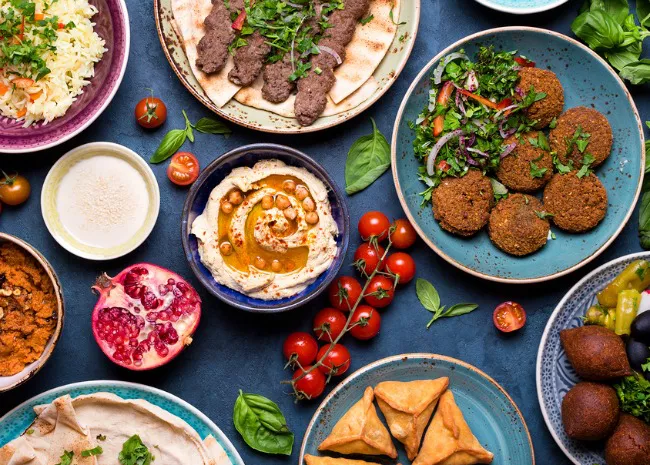Best Lebanese Food and Sustainability: A Deep Dive into Lebanese Makdous and Side Dishes

Lebanese cuisine is a delightful blend of flavors, textures, and aromas, offering a wide variety of dishes that cater to all taste buds. Known for its fresh ingredients and vibrant presentations, Lebanese food also champions sustainability, using locally sourced ingredients and traditional preservation methods. In this article, we'll explore the best Lebanese food with a special focus on Lebanese Makdous and a variety of Lebanese side dishes, highlighting their sustainability aspects.
Best Lebanese Food and Sustainability
Best Lebanese food and sustainability is more than just a culinary experience; it's a testament to a culture that values community, tradition, and sustainability. The best Lebanese food is often made from fresh, local ingredients, reducing the carbon footprint associated with transportation. Seasonal vegetables, grains, legumes, and olive oil are staples, ensuring a diet that's both nutritious and environmentally friendly.
One of the cornerstones of sustainable Lebanese cuisine is the practice of preserving seasonal produce. This not only reduces waste but also ensures that flavorful, nutritious food is available year-round. Techniques like pickling, drying, and fermenting are integral to Lebanese cooking, and one of the most beloved preserved foods is Lebanese Makdous.
Lebanese Makdous: A Flavorful Preservation
Lebanese Makdous is a traditional dish made from baby eggplants that are stuffed with a mixture of walnuts, garlic, and red peppers, then pickled in olive oil. This dish is a perfect example of Lebanese ingenuity in food preservation, offering a rich, tangy flavor that's both satisfying and sustainable.
Makdous is typically prepared in the fall when eggplants are in season. The process involves carefully selecting the best eggplants, boiling them, and then stuffing and pressing them to remove excess moisture. Finally, they're soaked in olive oil, which acts as a natural preservative. This method not only extends the shelf life of the eggplants but also infuses them with the aromatic flavors of the stuffing and the olive oil.
The sustainable aspect of Lebanese Makdous lies in its minimal waste approach. Every part of the eggplant is utilized, and the olive oil used in the pickling process can be repurposed for cooking, adding a depth of flavor to other dishes.
Lebanese Side Dishes: A Symphony of Flavors
No Lebanese meal is complete without an array of delicious Lebanese side dishes. These accompaniments not only complement the main courses but also showcase the diversity and sustainability of Lebanese cuisine.
1. Hummus: This globally loved dish is made from chickpeas, tahini, lemon juice, and garlic. Hummus is high in protein and fiber, making it a healthy and sustainable option. It's usually served with olive oil and a sprinkle of paprika, paired perfectly with fresh pita bread.
2. Tabbouleh: A refreshing salad made from parsley, tomatoes, bulgur, and mint, dressed with lemon juice and olive oil. Tabbouleh is a celebration of fresh, local ingredients and is a staple in Lebanese households.
3. Baba Ghanoush: Another eggplant-based dish, Baba Ghanoush is a smoky, creamy dip made from roasted eggplants, tahini, garlic, and lemon juice. It's a delicious way to use up surplus eggplants and is often enjoyed with pita bread or raw vegetables.
4. Fattoush: This vibrant salad features a mix of fresh vegetables, toasted pita bread, and a tangy sumac dressing. Fattoush is a great example of how Lebanese cuisine makes use of leftover bread, turning it into a delightful, crunchy addition to the salad.
5. Kibbeh: Often considered the national dish of Lebanon, Kibbeh comes in various forms, from baked to fried to raw. It's made from ground meat (usually lamb or beef), bulgur, and spices, and can be shaped into balls, patties, or even a pie. Kibbeh is a versatile dish that uses sustainable ingredients and can be adapted to different tastes.
FAQs
Q: What makes Lebanese food sustainable?
A: Lebanese food emphasizes fresh, local ingredients, seasonal cooking, and traditional preservation methods. This reduces the carbon footprint associated with food transportation and minimizes waste.
Q: How is Lebanese Makdous made?
A: Lebanese Makdous is made by stuffing baby eggplants with a mixture of walnuts, garlic, and red peppers, then pickling them in olive oil. The process involves boiling, stuffing, pressing, and soaking in olive oil.
Q: What are some common Lebanese side dishes?
A: Common Lebanese side dishes include Hummus, Tabbouleh, Baba Ghanoush, Fattoush, and Kibbeh. These dishes highlight the diversity and sustainability of Lebanese cuisine, using fresh and local ingredients.
Q: Why is preservation important in Lebanese cuisine?
A: Preservation allows for the enjoyment of seasonal produce year-round and reduces food waste. Methods like pickling, drying, and fermenting are integral to Lebanese cooking, ensuring flavorful and nutritious food is always available.
Lebanese cuisine, with its focus on sustainability and flavor, offers a unique culinary experience. From the tangy delight of Lebanese Makdous to the vibrant array of Lebanese side dishes, there's something for everyone to enjoy while also being mindful of the environment.
- Industry
- Art
- Causes
- Crafts
- Dance
- Drinks
- Film
- Fitness
- Food
- Games
- Gardening
- Health
- Home
- Literature
- Music
- Networking
- Other
- Party
- Religion
- Shopping
- Sports
- Theater
- Wellness
- News


